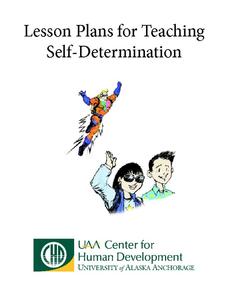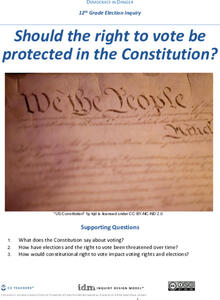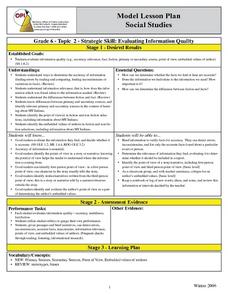Kids Voting USA
Kids Voting USA: K-2 Classroom Activities
Address both social studies and critical reading skills with a resource dedicated to the voting process, the American democracy, and the ability to evaluate information in order to develop a stance on an issue. Each themed activity set...
University of North Carolina
Psychology
Psychology, the scientific study of the human mind and behavior, is a popular major for many college students. An informative handout outlines common assignments in psychology courses. Scholars see how to design a research proposal,...
American Chemical Society
Evaporation
This is one in several lessons that explore the relationship between temperature and phase changes of water. After some discussion, elementary physical scientists place wet paper toweling on a hot and a room-temperature water bag and...
Facing History and Ourselves
Social Media and Ferguson
How can social media help or hinder civil dialogue? How can information shared on social media be verified? As the investigation of media reports of the events surrounding the shooting of Michael Brown continues, class members read news...
Institute of Electrical and Electronics Engineers
Tinkering with Tops
Get kids' heads spinning by challenging them to design a top that will rotate for a minimum of 10 seconds without leaving a 30-cm circle. Groups of learners collaborate through a planning stage, testing stage, and evaluation stage. Some...
iCivics
NewsFeed Defenders Extension Pack
Accuracy, transparency, trustworthiness, and impartiality are four unspoken rules of journalism. Scholars delve deep into the subject by discussing the pros and cons of relying on social media for news. They also play an online game to...
Foreign Policy Association
U.S. and Europe Online Lesson Plan
Class groups investigate the economic and political implications of a country's policies on genetically modified foods, craft a position paper detailing that policy, and share their findings with the class. Armed with this information,...
Institute of Electrical and Electronics Engineers
Get it Write
In an effort to practice engineering design, STEM classes break out into teams and endeavor to make a working ink pen. To prepare, they read about writing implements through history, patents, and viscosity of liquids. Armed with this...
University of Alaska
Lesson Plans for Teaching Self-Determination
How do we prepare kids, especially those with disabilities, for life after school, for the workplace, for independent living? This 96-page packet is loaded with self-assessment surveys, with skill builders, with information about rules,...
Odell Education
Making Evidence-Based Claims: Grade 8
American women have been working toward equal rights since the ink dried on the Declaration of Independence. Focused on the words and actions of Sojourner Truth, Shirley Chisholm, and Venus Williams, a language arts lesson takes eighth...
C3 Teachers
Uncle Tom’s Cabin: Can Words Lead to War?
"Words, words, words." Despite Hamlet's opinion, words can be significant. In this inquiry lesson, middle schoolers learn how the words in Harriet Beecher Stowe's Uncle Tom's Cabin, in the view of many, lead to the American Civil War. To...
C3 Teachers
Democracy in Danger: Should the Right to Vote Be Protected in the Constitution?
High school seniors investigate what national, state and local rules say about voting. After examining the Constitution's articles, clauses, and amendments, researchers look at videos, listen to podcasts, and read articles to gather...
Curated OER
Eyewitness Accounts
Students use eyewitness accounts to gather and evaluate information about the events of the May 18, 1980, eruption of Mount St. Helens. They play the following roles: reporter(s), eyewitnesses, and scientists who are investigating the...
Curated OER
Colonialism/The Arab/Israeli Conflict
Investigate critical historical issues using primary source documents then gather and evaluate information regarding the Jewish and Arab claims to land in Israel. Learners use their findings to prepare detailed timelines of events during...
Curated OER
Simple Rubric for Evaluating Internet Web sites
In this rubric worksheet, students evaluate a web site on a scale of 1-3. Students rate reliability, design and content. Worksheet is a blank, generic rubric.
Curated OER
Evaluating Web Sites
Students determine how to critically evaluate visual and medias aspects of web sites. They examine the purpose of assigned web sites.
Curated OER
Analyzing and Evaluating Literary Works
Learners evaluate the literary elements found in short stories. In this literature lesson, students read short stories of their choosing and list the examples of the literary elements they encounter in the story on the provided graphic...
Curated OER
Who Said That?
Students evaluate website content. They explore various websites, take an online quiz, and complete a "Quality Information Checklist."
Curated OER
Pathfinders: Using Information Resources
Eighth graders gather and use information on a chosen topic for a hypothetical research paper. They use organizational features of printed text, the Internet, and other media to locate information and choose a specific topic.
Curated OER
INFORMATION DETECTIVE
Students generate 2 or more questions without teacher support. They state known information and make personal connections without teacher support. They select two or more resources to answer his/her question. They distinguish...
Curated OER
Fostering Geospatial Thinking: Space to Earth: Earth to Space (SEES)
High schoolers locate and access data to help them with their science inquiry. In this geographical positioning lesson students evaluate and compare data sets.
Curated OER
Evaluating and Revising the Personal Plan of Study
Eleventh graders register for standardized tests and attend post-secondary information meetings that meet individual needs as well as work on updating and revising their personal plans for their futures. They brainstorm if any changes in...
Curated OER
Evaluating Informaton Quality
Sixth graders investigate the concept of the quality of information that is used to conduct research. They begin to conceive the differences between information that is fact or fiction. Students write a critique of an information source...
Curated OER
Evaluating and Rating Websites
Students discover how to evaluate information they find on the Internet. They work through a website that introduces them to the eight most important questions for checking the information on a website. Afterwards, students take an...
























